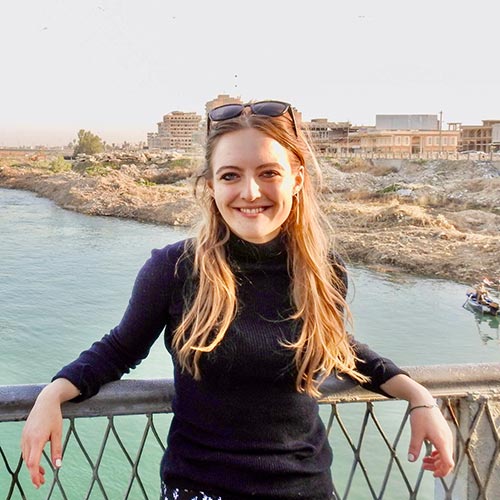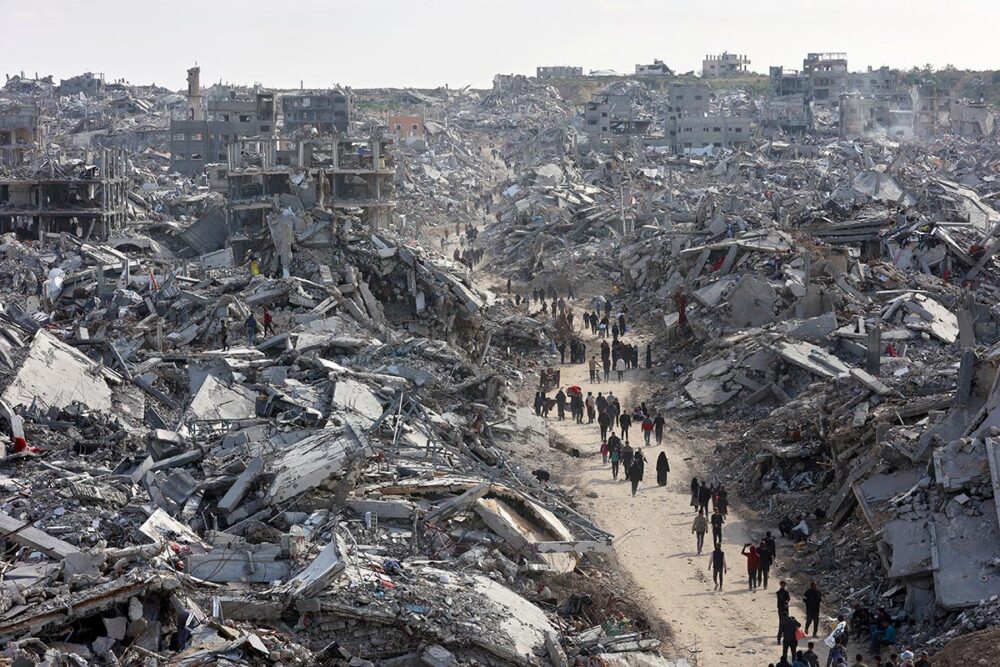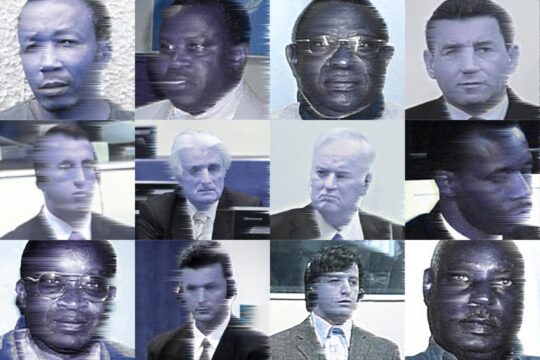In March 2025, the Government of Sudan brought an application against the United Arab Emirates (UAE) at the International Court of Justice (ICJ), accusing it of violating the 1948 Genocide Convention through material and military support to the Rapid Support Forces (RSF). The RSF, a paramilitary group, have been at war with Sudan’s armed forces (SAF) since April 2023. At first glance, the charge appears to affirm the strength of international legal frameworks in offering redress for the genocidal violence the RSF are accused of in Darfur. But it is the opposite; as Sudanese civilians suffer in a counter-revolutionary war, the de facto SAF government is using its position to take the UAE to court, rather than stopping its own abuses.
Since Sudan’s 2019 revolution ousted Omar al-Bashir, the country has been engulfed in a violent counter-revolution, and a brutal sick war between the SAF and RSF played out against civilians. There may be plausible claims of genocide in Sudan, and undoubtedly there have been grotesque atrocities committed against the Massalit people in Darfur, but the application before the ICJ was deeply concerning for its rampant politicisation of genocide. Both sides have bloodied hands. The case isn't about justice and impunity, but rather between rival military factions and their foreign backers, each vying for dominance in a fractured state.
It is an apt example of how the international definition of genocide has limited the protection of civilians in situations of extreme state violence. By focusing on the “intent to destroy” protected communities only, it dismisses alternative frameworks by prioritising “national, ethnical, racial or religious groups,” rather than political, social, gendered, and economic identities, and has become little more than another form of selectively deployed lawfare.
Genocide as lawfare
The Sudan versus UAE application, which was rejected by the ICJ for lack of jurisdiction on May 5, is not the first time that Darfur has been the focus of claims of genocide. In 2009 and 2010, the International Criminal Court (ICC) issued arrest warrants against former President Omar al-Bashir, including for genocide. Ugandan political scientist Mahmood Mamdani then condemned the West’s eagerness to claim genocide in Sudan while treating the “war on terror” as morally justified. To him, it was just another example of the racialised, selective application of international criminal law. More than a decade later, this dynamic continues. The Sudan versus UAE case coincided with the US State Department’s declaration of genocide in Sudan – while remaining silent on Gaza.
International law professor William Schabas has argued that genocide is increasingly used as a political weapon. Law professor Nada Ali's explanation that the UN Security Council's selective referrals to the ICC has meant geopolitical considerations take priority over individual rights, even in atrocities, means that it comes as little surprise that political factors impede the Genocide Convention’s application and enforcement, limiting the protection of civilians.
The case brought by Nicaragua against Germany before the ICJ in 2024 is another illustration of this. Nicaragua alleged that German arms exports and political support to Israel (despite the ICJ’s earlier provisional measures following the case brought by South Africa against Israel) violated Germany’s obligations under the Genocide Convention by contributing to a serious risk of genocide in Gaza. In April 2024, however, the ICJ declined to indicate provisional measures, finding that Nicaragua had not demonstrated the requisite plausibility that Germany’s support breached this duty at the provisional stage, and that the threshold was not met.
The contrast between Germany’s strong position on accountability for Russia’s actions in Ukraine and its response to Israel’s actions in Palestine raise serious questions about the consistency of genocide prevention under the law, not least because the ICJ previously affirmed in a case filed by Bosnia against Serbia that states have a duty to act when they know, or should know, of a serious risk of genocide. This ICJ’s 2007 judgment also held that a state’s duty to prevent genocide arises when it is “on notice” of a serious risk, even without a final determination, meaning that the obligation is one of conduct, not result. In 2019 after The Gambia led a suit against Myanmar the ICJ reaffirmed this – with the Court dismissing Myanmar’s objection that Gambia was merely a “proxy state”. In the same case in November 2023, the “Joint Declaration of Intervention by Canada, Denmark, France, Germany, the Netherlands, and the United Kingdom” questioned the very threshold for genocidal intent itself.
What’s in the “Intent to destroy”
Perhaps the most distinctive feature of the genocide definition is that it requires the “intent to destroy, in whole or in part, a national, ethnical, racial or religious group, as such”. While this was a political compromise at the time of its drafting in 1948, it has since become one of the most contested and exclusionary features of International Criminal Law. Raphael Lemkin, who first coined the word ‘genocide’ originally imagined it as encompassing political and cultural destruction, but these broader dimensions were removed during the drafting of the Convention. Lemkin’s contemporary Hersch Lauterpacht, in contrast, favoured the protection of individual dignity over group identity. In the Bosniacase, the ICJ held that a “pattern of conduct” may support an inference of genocidal intent, but only if it is the only reasonable inference, a threshold rarely met especially in contexts of chaotic or multi-faceted violence. As we see playing out in Gaza today, such an arbitrary standard limits intervention, contributes to legal paralysis, and enables killing.
Proving genocidal intent is also exceptionally difficult, because states often exploit interpretations of International Humanitarian Law (IHL) to mask genocidal acts as legitimate warfare. Luigi Daniele, Nicola Perugini, and Francesca Albanese have shown this clearly in recent scholarship setting out how Israel has weaponised IHL to “camouflage” its genocidal intent, facilitating the displacement and erasure of Palestinians in Gaza. States are responsible for accountability efforts for serious violations of IHL, but Israel's horrifying destruction of Gaza has involved a distortion of IHL, masking settler-colonial practices aimed at eliminating Palestinians.
The Katyn massacre of 1940, in which over 20,000 Polish officers and intelligentsia were executed by Soviet forces, illustrates how politically inconvenient atrocities fall outside genocide law. Scholar Louis FitzGibbon exposed how Allied governments suppressed Soviet responsibility for decades and, while FitzGibbon did not claim Katyn constituted genocide in the legal sense, his work shows how atrocities can be excluded from international justice frameworks due to the way legal categories intersect with realpolitik. FitzGibbon’s dedication to the truth, despite political resistance, also helps us to understand how the failure to acknowledge crimes which might disrupt powerful alliances can occur and has occurred.
Similarly, the indiscriminate atomic bombings of Hiroshima and Nagasaki are excluded from genocide law. Though they caused mass destruction and happened before the Genocide Convention, they did not target a group “as such” and therefore would fall outside legal protection. These examples reveal a core tension; that the law distinguishes between morally equivalent acts not by harm, but by motive. ICJ’s Israeli Judge Aharon Barak dissented from three of the measures indicated by the Court in the case of South Africa against Israel on the grounds that genocide had not been plausibly alleged, demonstrating the terrible irony that such legal caution may lead to further harm. The evidentiary challenge of proving “intent to destroy” – in whole, or in part, a protected group – is crucial, but all too often this has been entirely politicised, undermined, and deeply unhelpful for protecting civilian lives at the time of violence.
Genocide in Gaza
While Ukraine has so far quite effectively managed to use the language of genocide against Russia, invoking racialised dehumanisation and historical trauma to receive a broadly swift and sympathetic international response – this is in sharp contrast to Palestine. This disparity reflects Nimer Sultany and Alonso Gurmendi Dunkelberg’s recent scholarship of genocide law as a tool of modern and colonial international law, where atrocities against non-European populations are harder to name, and prove, and ultimately prevent. As Sultany writes in his exceptional article, “law and politics are intertwined”. While Dunkelberg argues that the conventional definition of genocide has been systematically narrowed, making it ineffective in addressing the recurring violence inherent in “colonial modernity”.
Dunkelberg also emphasises Lemkin's initial, far broader understanding of genocide as encompassing the destruction of a group's cultural, social, and economic foundations, not just physical extermination, and then shows how this broader understanding was subverted by the legal codification of genocide which focused on a narrow interpretation of intent, undermining any original anti-colonial potential. Although Dunkelberg notes how Lemkin himself contributed to the hiding of certain genocides, like the oppression of African Americans, by adopting a narrower interpretation later in his life, he also addresses the tragic irony of Lemkin's legacy: the very concept designed to prevent genocide has been manipulated by international law to obscure its prevalence and protect its perpetrators.
In Gaza, where Israel’s sustained military campaign has involved starvation, the bombing of hospitals and schools, mass displacement, and public statements that indicate genocidal intent, the limits of genocide law in the face of violent geopolitics is clear. Despite widespread civilian destruction and calls for extermination by Israeli officials, international legal bodies have hesitated to frame the violence as genocide – although the ICJ has accepted South Africa’s application against Israel for violations of the Genocide Convention and issued provisional measures. The international community continues to defer to legal process, as if the technical legal challenge of proving “intent” absolves its duty to prevent. Equally, while Palestine’s accession to the Rome Statute in 2015 has empowered its legal strategy in enabling the ICC to investigate international crimes committed in Palestine, accountability remains elusive. There is no doubt to Schabas that what Israel is doing in Gaza fully meets the definition of genocide. And yet the ICC has not changed this course.
The politics of genocide
Samantha Power, a former journalist who became the US Ambassador to the UN under President Obama, lamented in her book on genocide, that genocide law is invoked too late. As the head of USAID, Power herself has failed spectacularly to name Israel’s destruction of Palestinians as genocide. It is a grim irony that Power wrote the most recent introduction to Lemkin’s book, with its call for an “International Controlling Agency” vested with specific powers, such as the ability to visit occupied countries to ensure such atrocities never happen again. “Post-liberation is too late,” Lemkin wrote in 1944.
Despite being party to the Genocide Convention, and with a duty not only to prevent and punish genocide, but to do so regardless of territorial nexus, many states fail to act. The ICJ confirmed in the case of Bosnia v Serbia that this duty exists independently of proof that genocide has already occurred. The same should apply to third-party obligations under instruments such as the Arms Trade Treaty. Another “blind spot,” as professor Alex de Waal puts it, is “the neglect of starvation on the part of genocide scholars”, which is even more “striking because the intellectual father of genocide studies, Raphael Lemkin, was keenly interested in the politics of food and famine.” The starvation of civilians and the blocking of aid access in conflict, especially to coerce civilian populations, has been deemed criminal in the trial of Bosnian-Serb Radovan Karadžić and is prohibited under the Geneva Conventions. Starvation is also criminalised under the Rome Statute; and when carried out with intent to destroy a group in whole or in part, this act may constitute genocide. The ICC’s recent arrest warrants against Israeli officials reference alleged starvation tactics – but not genocide.
Rethinking justice
The challenge, then, is not just to name genocide, but to dismantle the legal and political conditions that enable it. In addition to legal and political inertia, the focus on genocide can displace more contextually appropriate responses. Looking at Gaza only through the lens of individual liability narrows the conversation, obscuring racialised patterns of state violence. A legal victory at the ICJ – or ICC, even if achieved, will not address these deeper harms. The same can be said of Sudan, where both SAF and RSF are now contesting legitimacy through legal claims while continuing their war against civilians. International law’s obsession with state actors and courtrooms excludes grassroots movements and revolutionary alternatives that could offer more meaningful paths to justice. In its current form, the Genocide Convention is deployed more often as a battleground for the powerful.
The 2014 genocide of the Yazidis in Iraq is one of the few post-Rome Statute examples where genocide has been widely and legally affirmed, including by UN investigative bodies, national courts, and governments. Yet even here, the aftermath has been marked by a troubling hierarchy of victimhood and the absence of meaningful prosecutions to resolve suffering. Amnesty International’s ground-breaking report on conflict-related sexual violence in Sudan, published to coincide with the recent second anniversary of the latest conflict, for example, does not mention the word ‘Genocide’ once.
The legal definition of genocide does not protect civilians in situations of extreme violence anymore than the legal case of Sudan against the UAE has resolved violence and stopped the killing of civilians. From Katyn to Gaza, Myanmar, Iraq and Darfur, the gaps in protection expose the contradictions of International Criminal Law – and global politics. The definition of genocide clearly enables moral condemnation, but this has not resolved civilian suffering. “According to some experts, what is happening in Gaza has the characteristics of a genocide,” the late Pope Francis wrote in an earlier draft of his autobiography. “It should be carefully investigated to determine whether it fits into the technical definition formulated by jurists and international bodies.” By the time of his book’s final publication, the Pope’s quote was gone.

Alannah Travers is a postgraduate at SOAS, University of London, specialising in the intersection of International Humanitarian Law, Human Rights and Islamic Law. She was previously based in Iraq, working with the Coalition for Just Reparations (C4JR) on the implementation of Iraq’s 2021 Yazidi Survivors’ Law and the closure of UNITAD. As a journalist and researcher, Alannah was awarded the Fetisov Journalism award in Excellence in Environmental Journalism for her reporting on gas flaring and is the Silver winner of the United Nations Correspondents Association 2023 Elizabeth Neuffer Memorial Prize.







